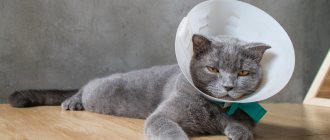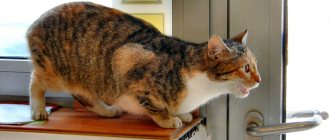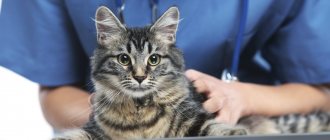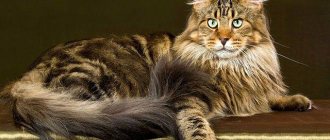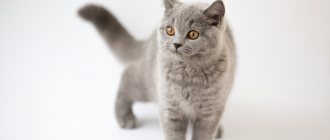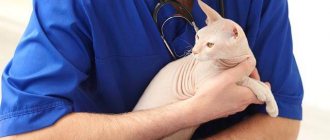When is it better to neuter your pet?
Having brought a small fluffy ball to your home, it is difficult to imagine a large and fluffy cat, its needs and desires. An adult, uncastrated pet living in a home apartment can become a real disaster. His natural desire to express himself and leave offspring can manifest itself in many ways:
- Cat concerts during a period of increased hormonal levels can infuriate the most patient owner.
- Tags with a strong odor.
- Changes in behavior occur due to stress under the influence of hormones. The animal becomes aggressive, may convulse, and urinate in unintended places.
- Escaping is a common occurrence for cats and kittens experiencing increased sexual desire.
- A pet that is regularly exposed to the attack of sex hormones is more susceptible to infections and tumor diseases.
Timely castration is the responsibility of the responsible owner of a purebred animal not intended for breeding. This measure allows you to preserve the pet’s health for a long time and take care of the best preservation of the breed.
Unfortunately, although in Western nurseries it is the breeder’s responsibility to castrate a Maine cat not intended for breeding, in Russian realities you can sometimes see stray Maine kittens walking along the city streets.
What is castration?
Castration of cats allows you to completely eliminate the appearance of offspring in your pet and reduce hormonal surges that affect his behavior. After the operation, the Maine Coon cat becomes calmer, does not yell during the mating season and damages the furniture less. Neutered animals are more attached to humans and have a sociable character.
Animals of both sexes are subject to castration. During the operation, hormone-producing organs are removed. For cats, the operation is simpler: the testicles are removed through a small incision in the scrotum. Based on the appearance of a castrated cat, it is difficult for a non-specialist to determine whether the animal is castrated: in a furry animal, the testicles are determined only by palpating the genitals.
Important! Castration can be carried out both after reaching puberty and at an early age of 8-16 weeks. The second option is common among Western breeders.
For a cat, the operation is more complicated, since internal organs - the ovaries and uterus - are removed. The operation can be performed traditionally, with an incision in the abdominal cavity, or endoscopically, through small punctures. The second option is more preferable. Advantages of endoscopic castration of cats:
- there is no direct contact between internal organs and the environment;
- painless incision;
- there is no need for a special postoperative period;
- no seams.
Castration of cats and female cats is carried out under anesthesia. For cats, the operation is more complex, so you should be more careful when choosing a veterinarian. Sometimes sterilization is offered for cats, which involves ligating the fallopian tubes. However, it is worth considering that although sterilized cats cannot have offspring, they still experience hormonal fluctuations.
Preparation for surgery and postoperative care
Preparation for surgery begins with the main thing - finding an experienced surgeon who performs such operations on a regular basis. It is extremely important that the surgeon is paired with a qualified anesthesiologist, and it is ideal if this anesthesiologist has experience working specifically with Maine Coons. It is undesirable for the surgeon himself to administer anesthesia - he may simply not have enough time and hands to monitor everything.
The main problem that a Maine Coon owner may encounter is problems with the pet’s heart.
IMPORTANT! To make sure that there are no contraindications, before the operation an ultrasound and ECG of the heart is mandatory and an examination by a cardiologist is carried out.
Other studies (blood and urine tests) are carried out according to indications for a particular animal, or if the owner so desires.
IMPORTANT! Check with the anesthesiologist whether general anesthesia or a tranquilizer will be administered; If it is possible to have surgery without anesthesia, choose it.
IMPORTANT! Insist that your pet be brought out of anesthesia with medication - this will shorten the recovery time and minimize the consequences.
The actual preparation for surgery on a healthy cat is that the animal is not fed 12 hours before surgery and the water is removed 4 hours before. If kittens are spayed before 12 weeks of age, the fasting period is reduced to 4 hours.
Postoperative care largely depends on the method of sterilization: with the endometrial method and sterilization of the cat, it is practically absent; with the traditional method, you will have to monitor the condition of the sutures and occasionally treat them. If attempts to lick the seams do not stop, you need to put a special collar on your pet. However, the need for a collar arises extremely rarely; usually the most difficult period of postoperative care is recovery from anesthesia, especially if no medication was taken.
Useful to read: Maine Coon Standards in WCF, TICA and FIFe systems
What are the options?
Often, compassionate owners strive to preserve their pet’s opportunity to experience the joys of sex and motherhood and reject castration. Such sentimental measures make everyone suffer, because there is not much to solve the issue of creating humane conditions for an animal suffering from hormonal desire:
- You can try organizing a date with your furry friend. After this, it will be necessary to take care of providing a place of residence for new coons or just outbred kittens.
- Use special veterinary medications. These can be herbal tinctures or hormonal contraceptives. Herbal remedies become addictive very quickly, and the use of chemicals is stressful for cats and can lead to a decrease in the animal’s immunity.
Important!
The use of feline contraceptives disrupts the endocrine system and provokes cancer. Castration allows you to maintain the health of the pet and the nerves of the owner. The operation, performed under general anesthesia, does not bring suffering to the animal, and the cessation of hormonal attacks has a beneficial effect on the animal’s body.
Many owners who initially resisted the idea of castration and then decided to do it as a last resort under the influence of the animal’s screams note how much the Maine Coon’s character has improved.
Best age
When is the best time to neuter a coon? The operation depends on the age of the pet. Maine cats are fully ready to reproduce after reaching the age of 7-9 months. Castration at this age is the best solution, as it prevents the animal from developing “adult” habits of marking territory and yelling in anticipation of meetings with the opposite sex.
Castration of mature cats
Often castration is performed at a later age for various reasons. Before the operation, it is necessary to conduct a preliminary examination of the animal. For a healthy animal, surgery occurs without complications, since the main risks are associated with the use of anesthesia.
Early castration
At what age to sterilize a cat, the owner decides independently. One of the available options is removal of the gonads at the age of 8-16 months. Advantages of early surgery:
- carried out without anesthesia;
- rapid recovery of kittens compared to adults;
- The breeder carries out such an operation before handing the baby over to the owner, so it is easier to bear mentally.
Contraindications
Before surgery, it is necessary to comprehensively examine the cat, especially for diseases of the cardiovascular system. This is important, since the danger of castration lies not so much in itself, but in the need for anesthesia. But it is contraindicated if you have heart problems.
Also, the procedure cannot be performed if:
- any acute diseases;
- lack of vaccinations;
- the female is in heat.
To perform an operation, the main thing is the pair “a good surgeon + anesthesiologist”. It is advisable that doctors have experience working with Maine cats. It is undesirable for the veterinarian to work for both specialists, as this may worsen control over the pet’s condition during the operation. The main risk is heart problems, so it is important to get all the required tests before surgery.
New life for a cat
After the operation, when all the stitches on the soul and body of the coon have healed, a new stage in the pet’s life together with its owner begins. If the animal was castrated as an adult, sexual behavior may still be observed for some time. Its cause is now habit, not sex hormones.
Timely surgery greatly simplifies the life of your furry companion, allowing him to live peacefully without unnecessary suffering from unfulfilled physiological needs.
The tendency of neutered cats to become extremely obese has been greatly exaggerated. If the owner pays attention to the pet’s nutrition and creates conditions for the coon’s physical activity, excess fat does not accumulate.
When choosing food and portion sizes, you must take into account that your pet's metabolic rate has slowed down somewhat, and he needs to reduce his caloric intake by a third. It is acceptable to use special food for feeding cats.
How to care for your pet after surgery
For a quick recovery after castration and a full life in the future, you need to know how to care for your pet correctly. If the operation was performed in a clinic, the animal remains there for some time. This is very important, the veterinarian must make sure that everything goes according to plan. After this time, the cat can be taken home, but it must be taken into account that for the next 2-3 hours there will be general weakness, dizziness and nausea. In the first week, it is necessary to monitor the operating area and constantly inspect it so as not to miss bleeding or infection of the wound. To make the stitches heal faster, it is recommended to treat them with antiseptics and, if there is redness, lubricate them with Lekomekol ointment. There should always be fresh water next to the bed. On the first day, the pet will not have time to eat. You should not force him to eat, as this can lead to irritation and vomiting. Your appetite will appear later and most likely it will be increased. You need to watch your diet to avoid obesity in the future. If the animal does not eat after 2 days, you should contact a veterinarian. When the cat starts to get up and move around, you need to place a tray nearby. It is recommended to use a light-colored filler so you can immediately see if there is any bleeding or pus.
Possible complications
Healthy pets calmly tolerate castration and recovery takes place without deterioration of their condition. However, there are times when health problems arise and you should always be prepared for them. Early complications appear during surgery. Your pet may experience bleeding or prolapse of testes. Late complications arise some time after the operation. The cause may be infection in the wound if an unsterile instrument is used or the surgical area is poorly treated. If the following symptoms appear, contact your veterinarian immediately:
- Purulent discharge from the wound.
- Refusal to eat.
- Pain when palpating or walking (gait changes).
- Problems going to the toilet.
- Sneezing, nasal discharge.
